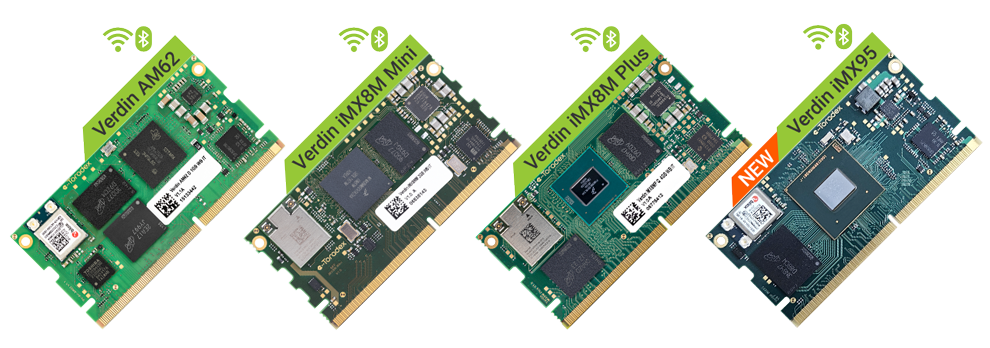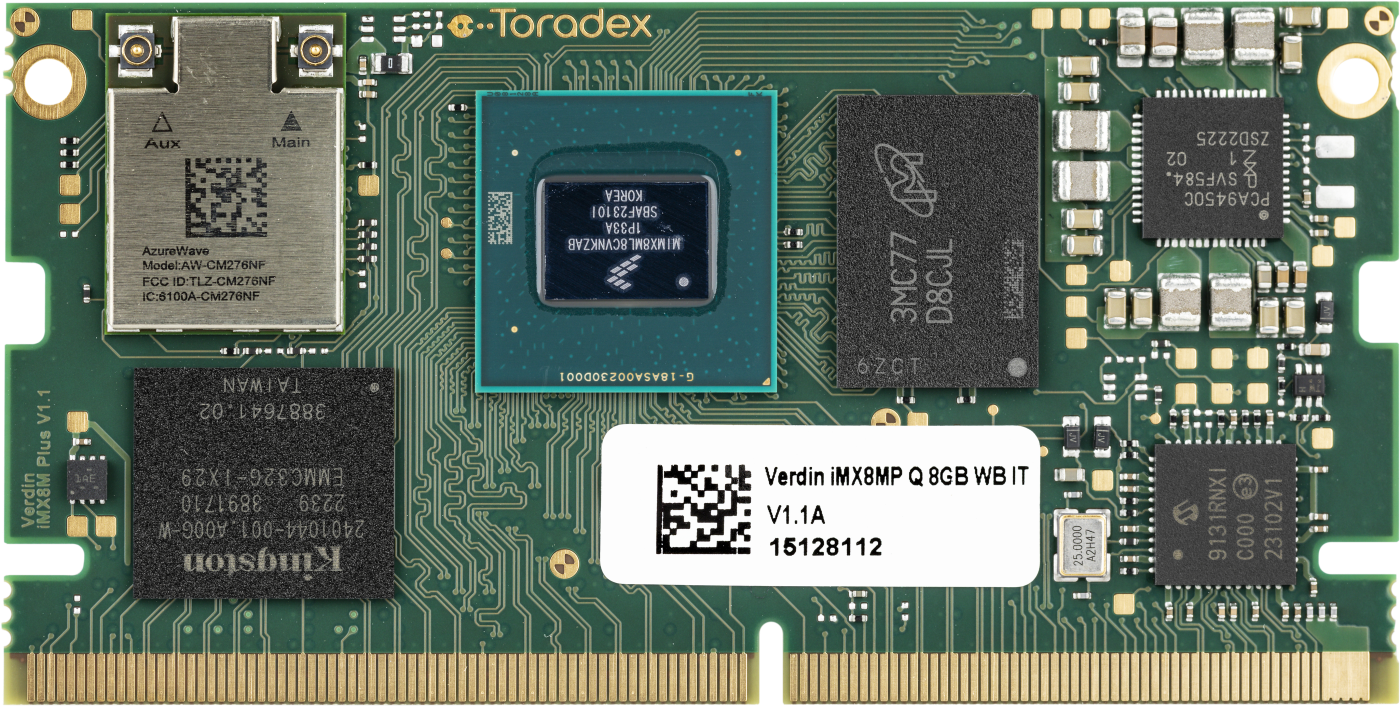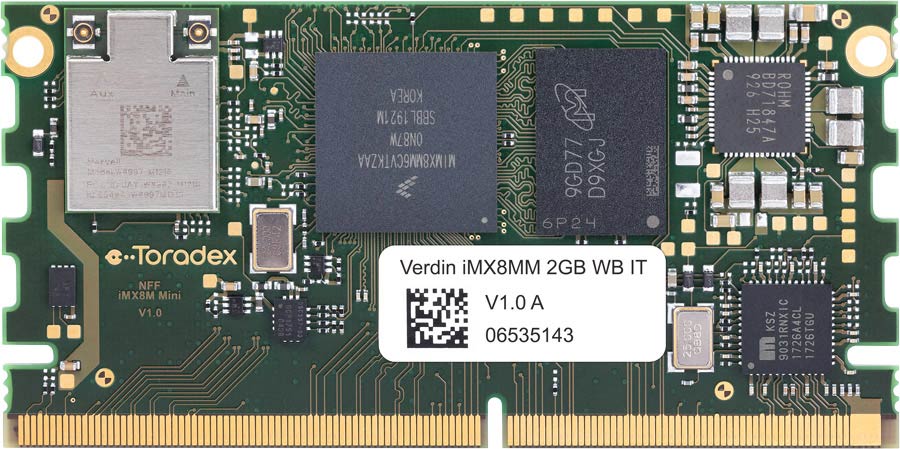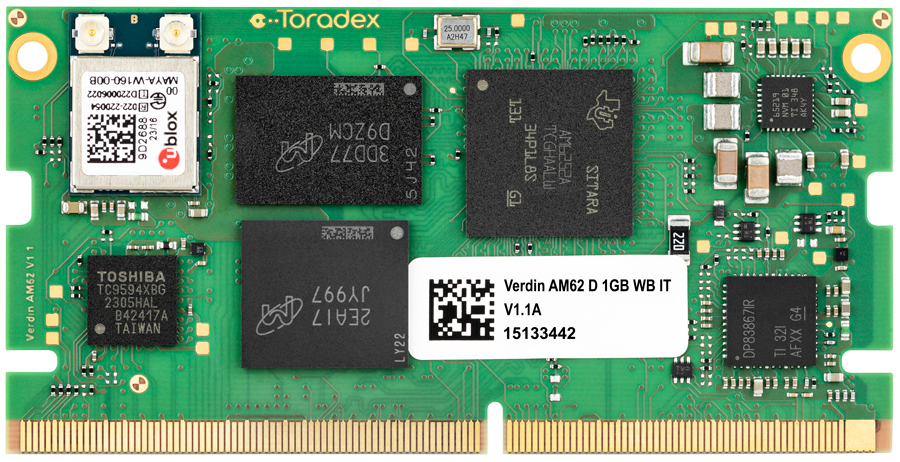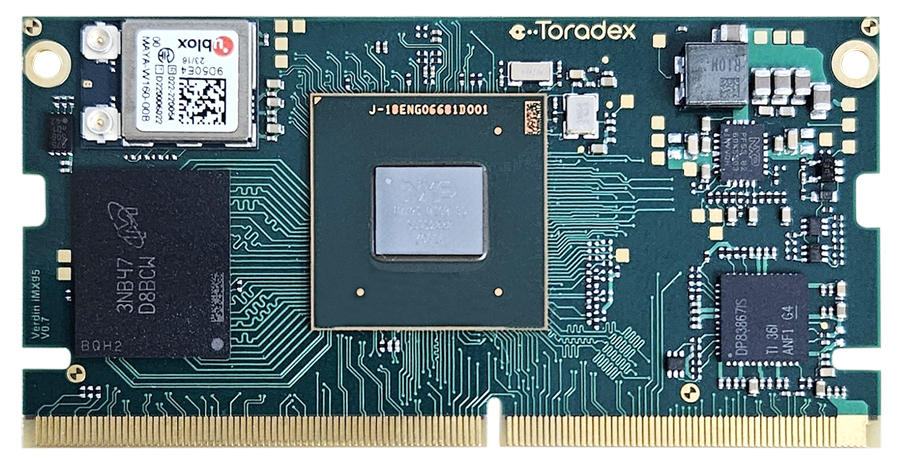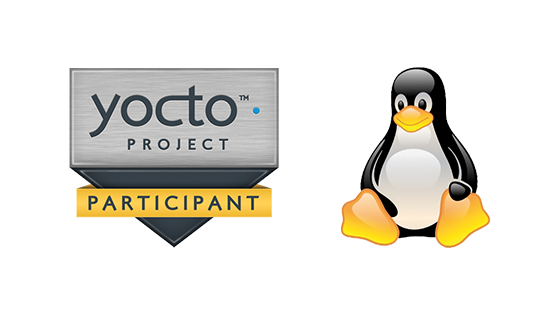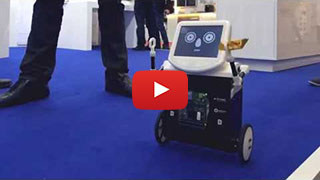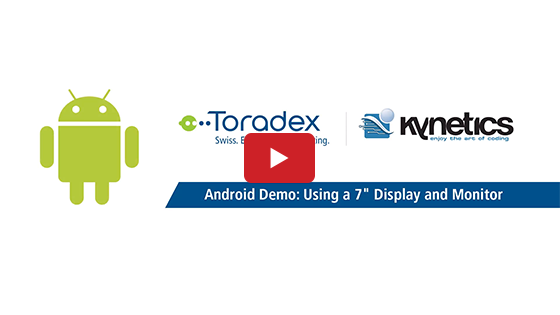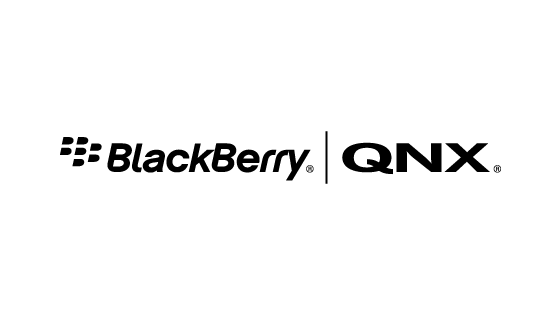Verdin Arm-Familie
Verdin ist ein System-on-Module-Standard, der die erfolgreichen Formfaktoren Colibri und Apalis erweitert. Er bietet ein überarbeitetes, modernes und leistungsfähiges Schnittstellenset und legt den Fokus auf Benutzerfreundlichkeit, Robustheit und Zukunftssicherheit.
Verdin ist ähnlich gross wie Colibri, hat aber eine höhere Pinzahl. Ein DDR4-SODIMM-Edge-Steckverbinder sorgt für eine kostengünstige, äusserst zuverlässige, schock- und vibrationsfeste Verbindung.
Die zukunftssichere Pinbelegung ermöglicht Entwicklern einen einfachen Zugang zu den neuesten Schnittstellen, und eine grosse Auswahl an Pin-kompatiblen Modulen sorgt für eine hervorragende Skalierbarkeit. Es stehen drei einfache Kategorien von Schnittstellenpins zur Verfügung. Vollständig kompatible Pins sind garantiert auf jedem Verdin-Modul verfügbar. Reservierte Pins haben eine bestimmte Funktion und sind auf den meisten Verdin-Modulen verfügbar. Typspezifische Pins bieten Zugriff auf spezifische Funktionen eines bestimmten SoC, sind aber nicht garantiert mit anderen Verdin-Modulen kompatibel.
Die Verdin-Familie nutzt das reichhaltige Toradex-Ökosystem und bietet branchenführenden kostenlosen Support, ein hauseigenes Open-Source-Linux-Betriebssystem und eine Reihe von Partner-Betriebssystemen wie Android und QNX. Eine breite Palette an branchenspezifischen Off-the-Shelf-Softwarelösungen (z.B. Qt, Crank und CODESYS) sind als einfach zu integrierende Pakete verfügbar. Darüber hinaus befindet sich eine breite Palette von off-the-shelf Trägerkarten bei Toradex und seinen Partnern in der Entwicklung.
Die ersten Verdin-Module sind mit dem NXP i.MX 8M Mini Applikationsprozessor erhätlich. Eine Version mit dem i.MX 8M Nano ist als Build-To-Order (BTO) Option erhältlich. Toradex bietet zudem ein Verdin-Modul mit dem NXP i.MX8M Plus Prozessor an, dieser enthält eine Neural Processing Unit (NPU), welcher sich ideal für Machinelearning Anwendungen eignet, sowie ein Verdin AM62 System-On-Module auf Basis des Am62x-Prozessors von Texas Instruments (TI).
Highlights
Verdin Computer-on-Modules-Familie
-
A53
-
A53
-
A53
-
A53
-
M7
-
3D GPU
-
NPU
-
ISP
-
VPU
-
8GB RAM
-
32GB FLASH
-
A53
-
A53
-
A53
-
A53
-
M4
-
3D GPU
-
VPU
-
2GB RAM
-
16GB FLASH
-
A53
-
A53
-
A53
-
A53
-
M4
-
3D GPU
-
2GB RAM
-
16GB FLASH
-
A55
-
A55
-
A55
-
A55
-
A55
-
A55
-
M7
-
M33
-
NPU
-
3D GPU
-
16GB RAM
-
128GB FLASH
-
A55
-
A55
-
A55
-
A55
-
A55
-
A55
-
M7
-
M33
-
NPU
-
3D GPU
-
16GB RAM
-
128GB FLASH
Videos
Vereinfachen Sie die moderne Produktentwicklung
Erster Blick auf das Verdin System-on-Module
Software
Torizon ist eine sofort einsatzbereite Linux-basierte Software-Plattform, die sich ideal für den Einsatz in Bereichen wie Industrie und Medizin eignet, in denen Zuverlässigkeit entscheidend ist. Das entwicklerfreundliche Ökosystem, vereinfacht den Prozess von Entwicklung und Wartung von Embedded-Software wesentlich.

Toradex entwickelt und pflegt ein Yocto Project-kompatibles, produktionsfähiges Embedded Linux BSP im Haus. Unsere umfassende Dokumentation...
Toradex bietet direkte Unterstützung für FreeRTOS auf Apalis iMX8 und Apalis. FreeRTOS ist ein Echtzeitbetriebssystem, das auf den Cortex-M4-Kernen parallel zum Hauptbetriebssystem läuft.
Android wird von unserem Servicepartner Kynetics unterstützt. Eine Evaluierung wird kostenlos als Binary Installer direkt auf Toradex Easy Installer Feeds und im Source-Code zur Verfügung gestellt.
QNX ist ein Mikrokernel-basiertes Echtzeit-Betriebssystem, das in erster Linie auf eingebettete Systeme abzielt, die ein hohes Mass an Safety und Security erfordern. Für Informationen über den aktuellen Stand von QNX wenden Sie sich bitte an unser Vertriebsteam.
Verdin Computer-on-Modules - Vergleichstabelle
The power consumption is subject to variation, depending on the situation. Our estimation of the minimum and maximum power consumption is based on the lowest idle power consumption and the highest power consumption values during maximum load. Refer our developer article for more information.
(1) The Wi-Fi/Bluetooth module featured on the SoM is rated for an operating temperature range of -30°C to +85°C. As this component is not deemed boot-critical, the SoM is still listed as an industrial temperature range product.
*WiFi6 | Bluetooth 5.3 (available for Custom Configuration)
Allgemein: Einige Schnittstellen sind auf Pins verfügbar, die innerhalb der Verdin Computer-on-Module-Familie nicht vollständig kompatibel sind. Es gibt Einschränkungen bei der gleichzeitigen Verwendung verschiedener Schnittstellen, bitte prüfen Sie das jeweilige Datenblatt für genaue Details.
Verdin Carrier-Boards
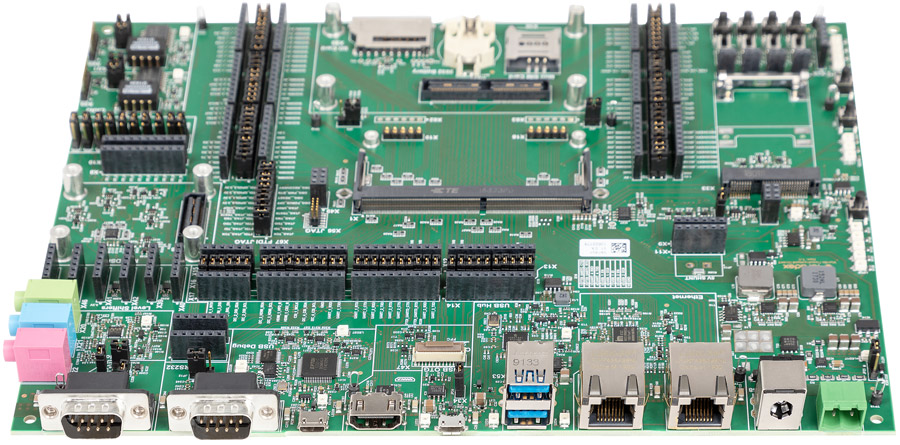
Das Verdin Development-Board ist ein voll ausgestattetes Carrier Board, das einen einfachen Zugang zu allen Funktionen der Verdin-Familie bietet. Es ist die ideale Plattform für Hardware-Entwicklung und -Integration. Das Board ist mit allen aktuellen und künftigen Verdin-Modulen kompatibel.
Ob USB 3.0, Gigabit Ethernet, HDMI, MIPI DSI, MIPI CSI oder PCIe: das Board bietet Zugang zu den Verdin High-Speed-Schnittstellen. Transceiver für CAN, RS-232 und RS-485 ermöglichen den direkten Anschluss von Schnittstellen nach Industriestandard.
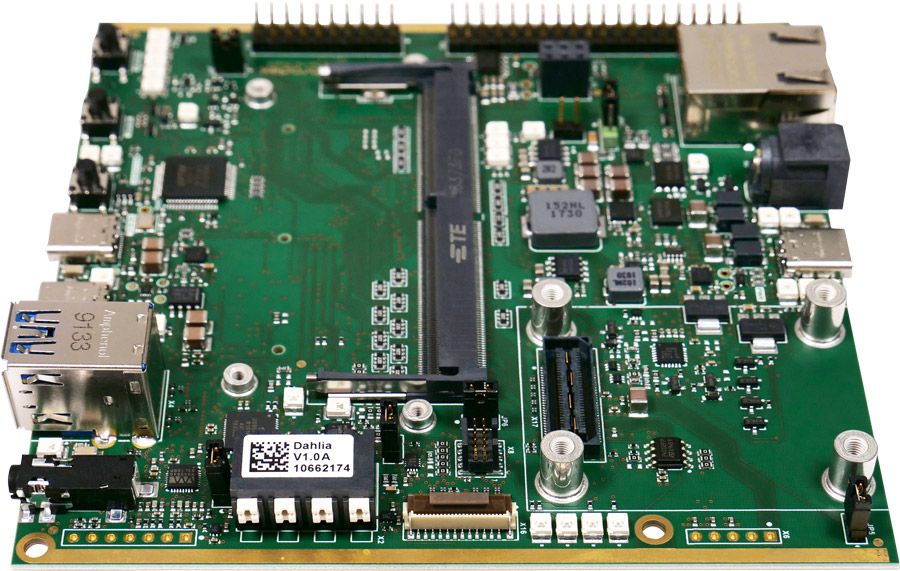
Dahlia ist ein kompaktes Carrier-Board, das einfachen Zugriff auf die gängigsten Funktionen der Verdin-Familie bietet. Es ist die ideale Plattform für Softwareentwicklung und Demonstrationszwecke. Das Board ist mit allen aktuellen und zukünftigen Verdin-Modulen kompatibel. Sie können Dahlia über einen USB-C-Anschluss mit Strom versorgen (USB-Power-Delivery-fähig). Das Board kann aber auch über einen Barrel-Anschluss (5V-27V DC) mit Strom versorgt werden.

Yavia is a compact carrier board providing easy access to the most common features of the Verdin family. Yavia has been designed by our partner Linear Computing to ease up the challenging supply chain situation constraining the availability of our traditional Verdin development carrier boards.
Be it USB 3.x, Gigabit Ethernet, HDMI, MIPI CSI or PCIe: the Yavia has them. Built-in UART to USB transceivers allow you to monitor and communicate with UART interfaces via USB - in a simple and convenient way, without any additional cables and accessories.
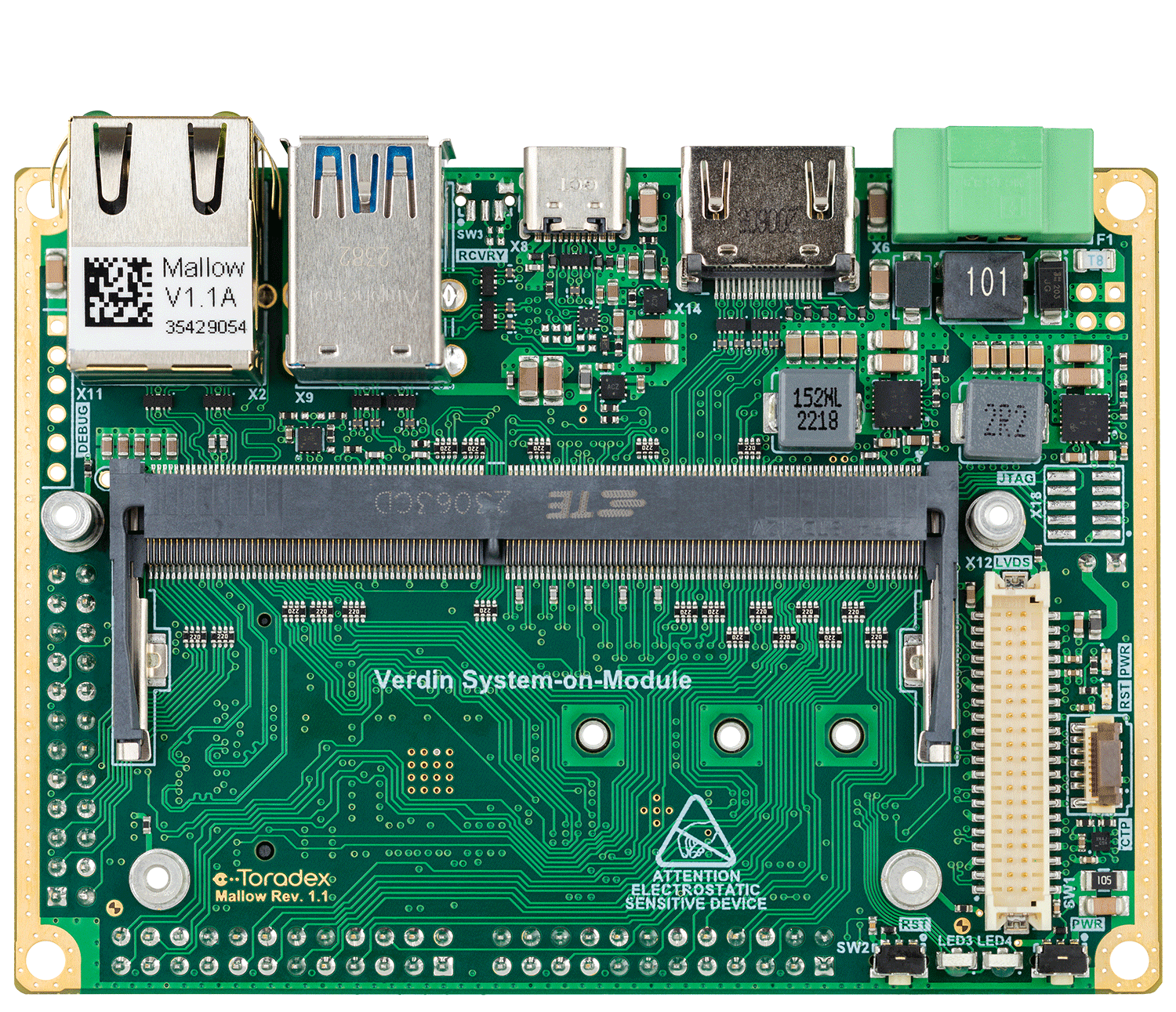
Mallow is a low-cost, small form-factor, and volume intended Carrier board compatible with Verdin System on Modules.
Has built-in UART, USB 3.x, HDMI, MIPI CSI or PCie which makes it usable in real-world volume products.
You can further extend the capabilities of the carrier board with daughter boards (via the extension connectors).
Andere Computer-on-Module-Familien
Die Computer-on-Modules (CoMs) der Apalis-Arm-Familie bieten modernste Rechenleistung mit hervorragender Grafik bei optimalem Stromverbrauch. Darüber hinaus werden Hochgeschwindigkeitsschnittstellen und umfangreiche Multimediaformate unterstützt. Einschliesslich kostenloser Betriebssystemunterstützung für Embedded Linux und Windows Embdded Compact.
Die Colibri Arm-Familie bietet ein umfangreiches Portfolio an Pin-kompatiblen System-on-Modules (SoMs). Diese SoMs haben einen kleinen Formfaktor, der durch viele Industrie- und Konnektivitätsschnittstellen ergänzt wird. Kostenlose Betriebssystemunterstützung für Embedded Linux und Windows Embdded Compact ist im Leistungsumfang enthalten.
